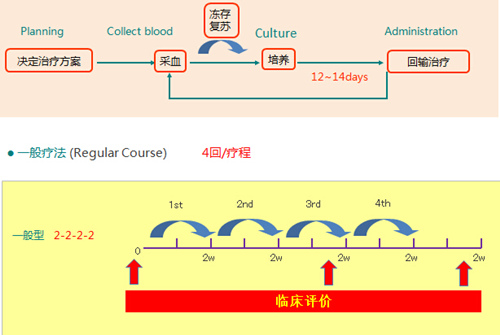Specific antigen T-cell immunotherapy involves drawing peripheral blood from the patient to obtain a large number of activated T-cells outside the body. These T-cells are then modified with tumor-specific antigens and reinfused into the patient. The antigen-modified activated T-cells, leveraging their lymphatic tissue homing properties, deliver tumor antigens to lymphatic tissues throughout the body, thereby stimulating active immunity against the tumor antigens. Additionally, these activated T-cells can target tumor cells and directly kill them through close binding.
特异性抗原T细胞免疫疗法是通过采取患者外周血,获得大量体外活化的T细胞,将肿瘤特异性抗原修饰到活化的T细胞上后输入回患者体内,抗原修饰的活化T细胞通过其淋巴组织归巢特性,将肿瘤抗原输送到全身淋巴组织,以激发肿瘤抗原性的主动免疫。活化的T细胞靶向肿瘤细胞还可通过与肿瘤细胞的紧密结合,被动直接杀灭肿瘤细胞。
特异性抗原T细胞免疫疗法是我公司的发明专利,通过采取患者外周血,在体外扩增和活化T细胞,将肿瘤特异性抗原修饰到活化的T细胞和NK细胞等单核细胞的表面,然后输回患者体内。抗原修饰细胞因其具有淋巴组织归巢特性,将肿瘤抗原输送到全身淋巴组织,有效地激发身体对肿瘤的主动免疫,杀灭肿瘤细胞。
This specific antigen T-cell immunotherapy is a patented technology of our company. It involves drawing peripheral blood from the patient, expanding and activating T-cells outside the body, and modifying the surfaces of these activated T-cells and NK cells with tumor-specific antigens before reinfusion. The antigen-modified cells, with their lymphatic tissue homing properties, deliver tumor antigens to lymphatic tissues throughout the body, effectively stimulating the body's active immune response against tumors and killing tumor cells.
淋巴细胞、抗原呈递细胞等免疫细胞具有淋巴器官与组织迁移和归巢的特性;
Lymphocytes and antigen-presenting cells among immune cells have the characteristics of migration and homing to lymphatic organs and tissues.
肿瘤特异性抗原修饰到淋巴细胞上,可迅速高效地输送到免疫器官;
Tumor-specific antigens modified onto lymphocytes can be rapidly and efficiently delivered to immune organs.
肿瘤特异性抗原修饰免疫细胞归巢后,在淋巴组织当中可充分与体内免疫细胞相互作用,并把抗原有效传递给体内的抗原呈递细胞,进而有效的刺激体内抗原特异性T细胞免疫反应;
After homing to lymphatic tissues, these antigen-modified immune cells can fully interact with other immune cells in the body and effectively transfer antigens to antigen-presenting cells within the body, thereby stimulating antigen-specific T-cell immune responses.
肿瘤特异性抗原修饰的T细胞或者NK细胞通过与肿瘤细胞的紧密结合,被动直接杀灭肿瘤细胞。
Tumor-specific antigen-modified T-cells or NK cells can directly kill tumor cells through close binding.
疗程方案与临床评价:
Treatment Regimen and Clinical Evaluation

临床评价指标:
体检一般指标评价:血常规、肝功能检查、肾功能检查。
免疫学指标评价:淋巴细胞亚群试验、INF-γ ELISPOT分析、细胞内染色流式细胞仪检测INF-γ(ICS)、血清抗体检测、抗原特异性反应T细胞的体外检测。
临床指标评价:肿瘤标志物的检查(AFP等)。
Clinical Evaluation Indicators:
General indicators of physical examination: blood routine, liver function test, kidney function test.
Evaluation of immunological indicators: lymphocyte subset test, INF-γ ELISPOT analysis, intracellular staining flow cytometry detection of INF-γ (ICS), serum antibody detection, and in vitro detection of antigen-specific response T cells.
Clinical index evaluation: examination of tumor markers (AFP, etc.).